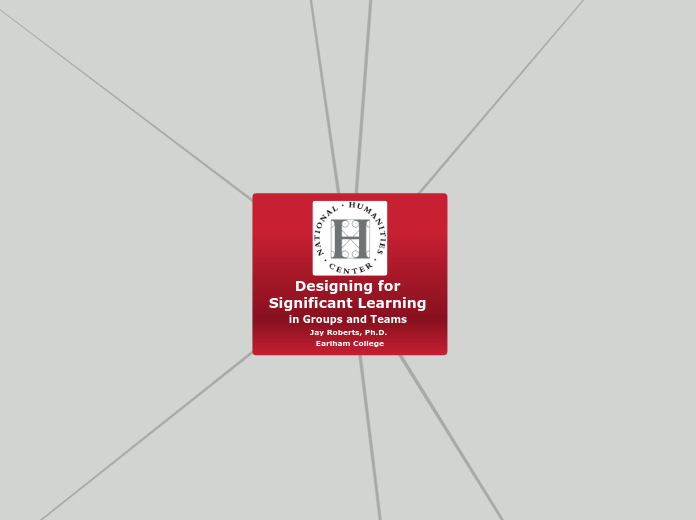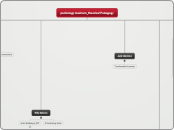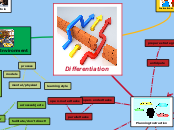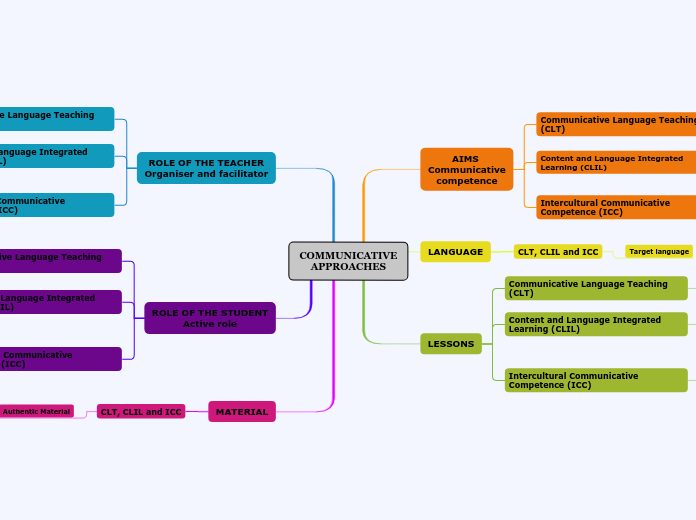Designing for Significant Learning
in Groups and Teams
Jay Roberts, Ph.D.
Earlham College
Group and Team Learning
Principles of Facilitation
Q and A/Discussion
Revisit Knowledge Inventory
Group Dynamics and Management
Interventions
Be prepared for failure
Grit, adaptation, resilience
Fail forward
What are your outcomes?
Return to First Principles
Models
Peer/group feedback
Plus, Delta (Roses and Thorns, Apples and Onions)
Gems and Opportunities
Continue, Start, Stop
Differentiation
Head Toward Trouble
Waterline Model
Stages
Processing
Don't speak...
Tools
Authentic Audience
Unfinal
Beautiful Mind
World Cafe
POL's
You Are Here Maps
Gallery walks
One word whips
Pass-the-passage
Digital Storytelling
Jigsaws
Fishbowls
Multi-modal
Interpersonal
Intrapersonal
Cognitive
Kindling, big logs, and progressions
What? So What? Now What?
On-going (not just at end of experience)
Framing and Tone Setting
5 Cohesive Team Behaviors
Social Context
Google study: Psychological safety
Full-Value Contracts
Relationships 101
Are they ready?
Make outcomes relevant and overt
Sense of invitation
Team Exercise
Surviving and Thriving with Significant Learning
Authenticity
Grow your EQ
Know Thyself
Edu-preneurship
75/25 rule
Remember the creativity curve
Be creatively restless
Fail fast, fail forward
Time Management
Create efficiencies (grading, project mgmt, etc.)
Find your resources
On campus
On-Line
The Real Work
It may be that when we no longer know what to do
we have come to our real work,
and that when we no longer know which way to go
we have come to our real journey.
The mind that is not baffled is not employed.
The impeded stream is the one that sings.
~ Wendell Berry
Final Reflections and Takeaways
Designing for Significant Learning
Common Design Traps
Teams
Mini- Curriculum Workshop
Tweaking an existing course?
Dream course?
Design challenge?
Lack of support/oversight of teams
Failure to adapt- designing room to breathe
Poor pacing/project management
Insufficient scaffolding
Activity for activities sake
Edutainment
Failure to align learning goals, activities, and assessments
Doing More, Not Doing Different
3 Conceptual Design Frames
3. Integrated Course Design
"Assessment is a process by which information is obtained relative to some known objective or goal. Assessment is a broad term that includes testing. A test is a special form of assessment. Tests are assessments made under contrived circumstances especially so that they may be administered. In other words, all tests are assessments, but not all assessments are tests."
http://www.adprima.com/measurement.htm
How do we know what we are doing is working?
2. EELDRC
Pairs: E b4 L (ideas? examples?)
CONNECT: On-ramping with other content, experiences
REVIEW: Multiple opportunities for feedback and reflection
DEMONSTRATE: Practice through content
LABEL: Punctuated direct instruction
EXPERIENCE: Experience Before Label!
ENROLL: The importance of framing
Experience before Label
Importance of student-centered exploration FIRST
STANFORD STUDY
“We are showing that exploration, inquiry and problem solving are not just ‘nice to have’ things in classrooms,” said Blikstein. “They are powerful learning mechanisms that increase performance by every measure we have.” Pea explained that these results indicate the value for learning of first engaging one’s prior knowledge and intuitions in investigating problems in a learning domain – before being presented with abstracted knowledge. Having first explored how one believes a system works creates a knowledge-building relevance to the text or video that is then presented, he said."
http://blogs.kqed.org/mindshift/2013/07/before-reading-or-watching-videos-students-should-first-experiment/
Experiential Learning Cycle
1. UbD
Authentic Assessment (Wiggins and McTighe)
Allows opportunities to rehearse, practice, get feedback, and refine
Discrete lessons are made meaningful toward mastery
Asks students to integrate across KSA's (not isolate)
Replicates challenging "real life" situations
Asks students to "do" the subject
Requires judgement and innovation
Realistically contextualized
Backmapping
Know, feel, do
What are the enduring understandings?
Key Principles
Creativity Curve
Chunking and stages
"Clean beginnings and clean endings"
IBFVTNOJBLKFJ
Scales
Micro
Example: Daily Query
Meso
Example: Barrios of Richmond
Go Big!
Example: Shakespeare Festival
No "one best way"
Significant Learning (Fink)
JFK LBJ ON TV FBI
The Context for Significant Learning
Teaching and Learning Today
4. Three "Let it Go's"
3. Self-Sufficiency
"In survey after survey, employers seem to agree that the skill they most want in future workers is adaptability. Those who hire complain that they often find today’s college graduates lacking in interpersonal skills, problem solving, effective written and oral communication skills, teamwork, and the ability to think critically and analytically."
From: http://chronicle.com/blogs/next/2012/09/12/skills-gap-employers-and-colleges-point-fingers-at-each-other/
Ages 5-18
"Likes"
Personal connections
Small class sizes
Professional opportunity
Real world experience
Hands-on learning
2. Content
The "Plurivium"
Enduring understandings
paired share: what do you want your students to say 1 year after course?
Less Is More
Coverage-> Uncoverage
American Academy for the Advancement of Science:
“As biology faculty, we need to put the “depth versus breadth” debate behind us. It is true today, and will be even more so in the future, that faculty cannot pack everything known in the life sciences into one or two survey courses. The advances and breakthroughs in the understanding of living systems cannot be covered in a classroom or a textbook. They cannot even be covered in the curriculum of life sciences majors.
The time has come for all biology faculty, but particularly those of us who teach undergraduates, to change the way we think about teaching..." (2009)
1. Lecturing
D. Meiers: "Teaching is listening and learning is talking."
Lecturing->Direct Instruction
Is It Ever OK to Lecture?
"On the one hand, research on the matter is quite convincing: A 2014 meta-analysis of 228 studies of lectures and active-learning strategies showed that the results were decidedly one-sided in favor of active learning. So much so that the authors found it questionable ethically to make students attend lecture-based courses, given all that we know about how ineffective they are."
On the other hand, the vague way in which active-learning strategies are discussed means ... that "it can create the illusion that the answers to teaching challenges are both monolithic and easily developed." Active learning ... has become "an easy thing to prescribe as a cure but difficult to put into practice because it covers such a vast array of possibilities." - D. Gooblar, 2019
3. Gallup Poll "Big 6"
3% agreed to all 6.
6. Extremely active in extracurricular activities and organizations
5. Internship or job that allowed me to apply my learning
4. Work on a project that took a semester or more to complete
3. A mentor who helped me pursue my goals and dreams
2. Professors who cared about me as a person
1. A professor who excited me about learning
2. High Impact Learning Practices (AAC&U, 2008)
Immersion experiences
Diversity/global learning
Internships and project-based learning
Undergraduate research
Service learning, community based learning
Collaborative assignments and projects
Learning communities
1. Instruction vs Learning
Barr and Tagg
Inquiry
TOOLS: Making the invisible, visible
Make it overt
Theirs-Ours-Theirs
Tone setting
Pre-Exposure and open loops
Goals
Appreciate the power of open-ended, messy, collaborative inquiry
Learn new approaches and get inspired through collaboration
Understand context of teaching and learning today in HE
See, experience, and learn a variety of useful strategies and tools
Continue building team cohesion
Gallery walk
In teams
What questions do you have?
What do you want to know/learn?
Posters
Knowledge inventory
Christchurch Earthquake, 2011
Team Magic Bus
Introductions and Overview
Openings
Prepare for the firehose!
Learning happens everywhere
Interrupt me at any time
Comfortable being uncomfortable
teaching is private AND public
Useful not universal
Playlists
Workshop Overview
Surviving and thriving with significant learning
Tools and strategies for group and team-based learning
Team exercise
Lunch!
Designing for significant learning
Context of significant learning
Framing and tone setting
Introductions
Paired Share Progression
Fabulous success?
Fabulous failure?
Favorite place









